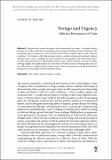Files in this item
Vertigo and urgency : affective resonances of crisis
Item metadata
| dc.contributor.author | Knight, Daniel M. | |
| dc.date.accessioned | 2022-12-12T14:30:02Z | |
| dc.date.available | 2022-12-12T14:30:02Z | |
| dc.date.issued | 2022-12-01 | |
| dc.identifier | 282143450 | |
| dc.identifier | fa681267-404c-4d48-b6bc-3fe7862b3dd1 | |
| dc.identifier | 85143409674 | |
| dc.identifier | 000904427700003 | |
| dc.identifier.citation | Knight , D M 2022 , ' Vertigo and urgency : affective resonances of crisis ' , Social Anthropology , vol. 30 , no. 4 , pp. 37–53 . https://doi.org/10.3167/saas.2022.300404 | en |
| dc.identifier.issn | 0964-0282 | |
| dc.identifier.other | ORCID: /0000-0001-9197-983X/work/124078958 | |
| dc.identifier.uri | https://hdl.handle.net/10023/26578 | |
| dc.description.abstract | Crisis provokes a sense of urgency often experienced as vertigo – the intense disorientation as to where and when one belongs on the temporal timeline of pasts and futures. The nauseating affects of urgency can be located in both crisis as sudden rupture and as chronic condition – the former a cliff-edge moment where a schism in historical continuity induces dizziness and a sense of falling, the latter defined by inescapability and suffocating captivity. This article presents the relationship between crisis, urgency and the concept of vertigo, offering insights from philosophy and social theory. Further, based on ethnography from crisis-ridden Greece, it explores how vertigo orients collective timespaces and affectively fosters imaginative relationships with the imminent future. | |
| dc.format.extent | 17 | |
| dc.format.extent | 733513 | |
| dc.language.iso | eng | |
| dc.relation.ispartof | Social Anthropology | en |
| dc.subject | Crisis | en |
| dc.subject | Future | en |
| dc.subject | Greece | en |
| dc.subject | Urgency | en |
| dc.subject | Vertigo | en |
| dc.subject | GN Anthropology | en |
| dc.subject | T-NDAS | en |
| dc.subject | AC | en |
| dc.subject | MCC | en |
| dc.subject.lcc | GN | en |
| dc.title | Vertigo and urgency : affective resonances of crisis | en |
| dc.type | Journal article | en |
| dc.contributor.institution | University of St Andrews. Centre for Energy Ethics | en |
| dc.contributor.institution | University of St Andrews. Social Anthropology | en |
| dc.contributor.institution | University of St Andrews. Centre for Cosmopolitan Studies | en |
| dc.identifier.doi | 10.3167/saas.2022.300404 | |
| dc.description.status | Peer reviewed | en |
This item appears in the following Collection(s)
Items in the St Andrews Research Repository are protected by copyright, with all rights reserved, unless otherwise indicated.

